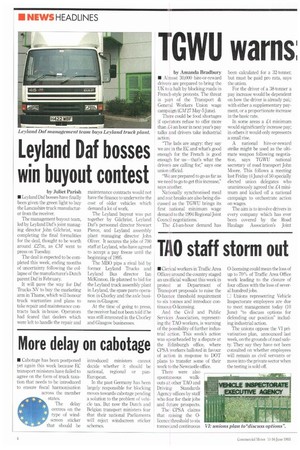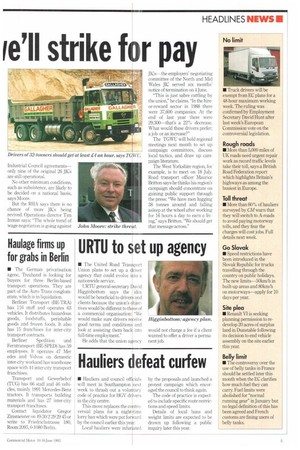GWU warns fell strike for pay
Page 6

Page 7

If you've noticed an error in this article please click here to report it so we can fix it.
by Amanda Bradbury
• Almost 30,000 hire-or-reward drivers are prepared to bring the UK to a halt by blocking roads in French-style protests. The threat is part of the Transport & General Workers Union wage campaign (CM 27 May-5 June).
There could be food shortages if operators refuse to offer more than £4 an hour in next year's pay talks and drivers take industrial action.
he lads are angry: they say we are in the EC and what's good enough for the French is good enough for us—that's what the drivers are calling for," says one union official.
"We are prepared to go as far as we need to go to get this increase," says another.
Nationally synchronised meal and rest breaks are also being discussed as the TGWU brings its first national minimum wage demand to the 1994 Regional Joint Council negotiations.
The £4-an-hour demand has been calculated for a 32-tonner, but must be paid pro rata, says the union.
For the driver of a 38-tonner a pay increase would be dependent on how the driver is already pai,: with either a supplementary payment, or a proportionate increase in the basic rate.
In some areas a £4 minimum would siginificantly increase pay; in others it would only represents a small rise.
A national hire-or-reward strike might be used as the ultimate weapon following negotiation, says TGWU national secretary of road transport John Moore. This follows a meeting last Friday (4 June) of 50 specially elected union delegates who unanimously agreed the £4 minimum and kicked off a national campaign to orchestrate action on wages.
The aim is to involve drivers in every company which has ever been covered by the Road Haulage Association's Joint Industrial Council agreements— only nine of the original 26 JICs are still operational.
No other minimum conditions, such as subsistence, are likely to be decided on a national basis, says Moore.
But the RHA says there is no chance of more JICs being revived. Operations director Tim Inman says: "The whole trend of wage negotiation is going against JICs—the employers' negotiating committee of the North and Mid Wales JIC served six months' notice of termination on 4 June.
"This is just sabre rattling by the union," he claims. In the hireor-reward sector in 1988 there were 37,600 companies. At the end of last year there were 29,300—that's a 22°. decrease. What would these drivers prefer: a job or an increase?"
The TGWU will hold regional meetings next month to set up campaign committees, discuss local tactics, and draw up campaign literature.
The West Yorkshire region, for example, is to meet on 18 July. Road transport officer Maurice Britton says he thinks his region's campaign should concentrate on gaining public support through the press: "We have men lugging 38 tonnes around and falling asleep at the wheel after working for 16 hours a day to earn a living," says Britton. "We should get that message across."












































































































